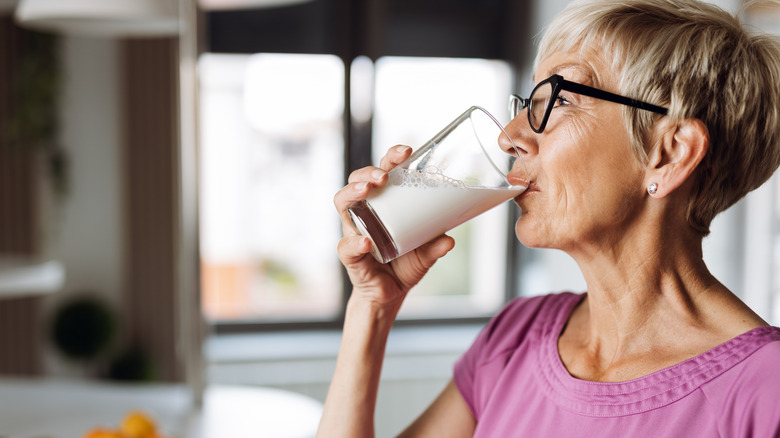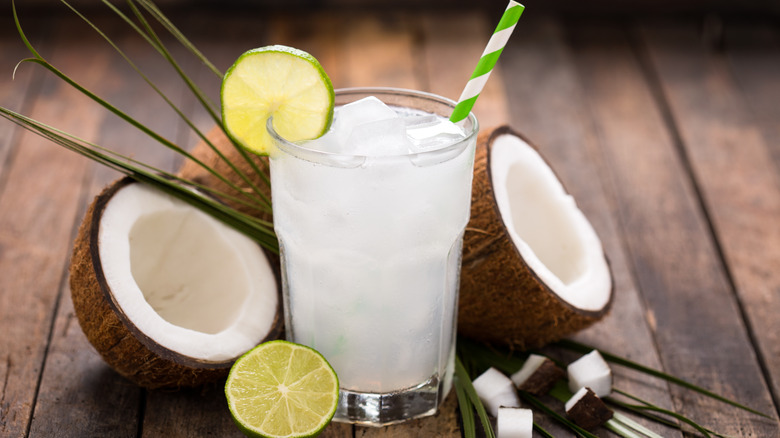Study Shows The Best Drink For Hydration (And It Isn't Water)
We know that hydration is important, but in what specific ways does it benefit the body? As it turns out, in almost every possible way! Flushing our bodies with liquid on a daily basis helps with joint lubrication, organ function, sleep, cognition, the transportation of nutrients, protection against infection, and much more (via Harvard T.H. Chan). While coffee, tea, and certain food sources, such as celery, can all supply our body with fluid, water is thought to be the king of hydration. In fact, men are advised to drink approximately 16 cups of water every day and women are recommended to drink about 11 cups.
However, some research shows that perhaps water may need to relinquish its crown. Researchers from a 2016 study published in The American Journal of Clinical Nutrition looked at the effects of 13 different beverages on fluid balance in more than 70 male participants. The types of beverages tested included sodas, sports drinks, beer, hot coffee, cold tea, milk, and more. While each participant consumed only three of these different beverages, all of the men received still water. You would probably never guess which drink proved to be the most hydrating.
Milk won out over water, but what makes it so hydrating?
Through urine analysis, the study revealed milk to be more hydrating than water. These results proved true for both skim milk and whole milk. Such findings lend further support to earlier research, including a 2011 study conducted by McMaster University researchers which showed milk to be a superior source of rehydration for kids after exercise compared to water or sports drinks.
So what makes milk so hydrating? "Milk offers many benefits not found in water including electrolytes, carbs, protein, minerals, vitamins and healthy fats," said Akash Bajaj MD MPH, Triple Board Certified, Anti-Aging and Longevity Specialist, in an exclusive interview with Health Digest. "Milk is superior to water as a hydration source because it helps to slow the emptying of water from the stomach so you remain hydrated over a longer period of time." In other words, because milk is ripe with so many nutrients, the body holds on to it for a longer stretch of time, as it requires more time to be broken down.
Hydrating alternatives to milk
Before you run to the grocery store to stock up on milk, however, note that overconsumption of dairy can have its drawbacks. This can include bloating, nausea, diarrhea, and overall gastrointestinal discomfort — particularly for those who may have lactose sensitivities. Alternatively, some types of milk may potentially exacerbate acne if the cows have been treated with synthetic growth hormones, according to Insider. Thankfully, milk isn't the only beverage we can turn to for hydration. "There are a number of excellent alternatives including caffeine-free teas that can be consumed hot or cold, coconut water, sports drinks that contain electrolytes and carbohydrates, fruit/veggie-infused water, and various forms of sugar-free milk products including almond and soy milk," Dr. Bajaj tells us.
At the end of the day, however, these beverages should not be used as a substitute for water. "Simply put, since our bodies consist mostly of water i.e., cells, tissues, organs, etc., it's important to maintain hydration it will start to fail," Dr. Bajaj states. "We need fluids to keep our blood circulating, digestion tract unimpeded, organs to function properly and body temperature regulated properly." All in all, consider milk to be a great complement to your daily H₂O intake.
When to drink water vs. when to drink milk
It's clear that milk certainly has some hydrating qualities, but that doesn't mean we should neglect our water intake altogether. In fact, Dr. Kristin Struble told 12News that water should always be a priority. While our body may hold on to the fluids of milk longer than water, it may not leave us feeling as if our thirst has been satisfied. The reason is that when we drink cow's milk, it promotes mucus accumulation in the throat. Basically, milk may be better suited for a road trip to help keep rest stop breaks to a minimum, but not for everyday hydration.
However, staving off trips to the bathroom may not be all milk is good for. Experts at Real Simple note that milk may also be a good fit following an intense workout. After a bout of intense physical activity, the body is short on electrolytes and various essential nutrients, such as protein and carbs. Therefore, milk may do a better job than water at restoring what was lost. Not only that, but it may also help keep muscle soreness at bay.



